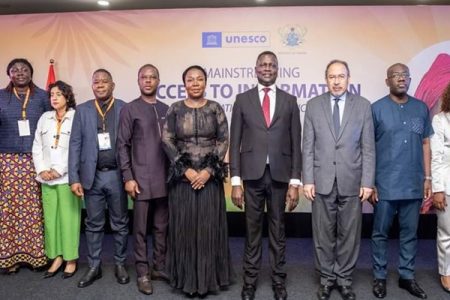Ghana has received high praise from United Nations Educational, Scientific and Cultural Organization (UNESCO) for its successful implementation of the Right to Information (RTI) law, which has been hailed as a model for other African nations.
During the global conference marking the 2024 International Day for Universal Access to Information (IDUAI), UNESCO’s Assistant Director-General for Communication and Information, Mr Tawfik Jelassi, highlighted the law’s effectiveness in promoting transparency and accountability in governance.
“The Right to Information Act, adopted in 2019, has been developed with contributions from key stakeholders, including journalists, civil society organizations, and academia,” Mr Jelassi noted, emphasizing that this collaborative effort has made Ghana a success story in Africa.
The conference, held at the Alisa Hotel in Accra under the theme “Mainstreaming Access to Information and Participation in the Public Sector,” brought together various dignitaries, including Minister for Education and Chairperson of Ghana’s Commission to UNESCO, Dr. Osei Yaw Adutwum.
In a statement delivered on behalf of President Nana Addo Dankwa Akufo-Addo, Dr. Adutwum reaffirmed Ghana’s commitment to enhancing open governance and accountability, stating that the RTI law is a significant step toward achieving these goals.
Highlighting the role of access to information as a fundamental right, Jelassi noted that African countries are increasingly adopting legal frameworks that empower citizens to access public information.
This, he stated, is essential for fostering transparency and encouraging citizen participation in governance.
President Akufo-Addo also stressed the importance of political will in realizing the right to information, declaring that an informed public is crucial for holding leaders accountable.
He urged public officials to adopt a culture of openness, ensuring that information is shared freely as a public good.
The President called for the proactive dissemination of data by government institutions and emphasized the need for investments in digital platforms to enhance transparency.
“Citizen participation is the oxygen of democracy,” President Akufo-Addo stated, underscoring the government’s efforts to decentralize decision-making and create avenues for marginalized groups—including women, youth, and rural communities—to engage in public discourse.
Minister for Information Madam Fatimatu Abubakar echoed these sentiments, advocating for the continued mainstreaming of access to information as a vital tool for participatory governance. “Access to information empowers citizens, providing the foundation for informed participation in decision-making and fostering accountability,” she asserted.
Since the passage of the RTI Act in 2019, Ghana has made significant strides toward greater transparency, and this year’s theme for the IDUAI celebration underscores the critical importance of access to information in democratic governance and citizen empowerment.
The ongoing commitment to transparency and citizen engagement is seen as pivotal for achieving both democratic and developmental goals in Ghana and across the continent.
- We are all Natasha, and we don’t kiss just anybody - 31 March 2025
- MTN FA Cup: Kotoko to face Berekum Chelsea in semis - 31 March 2025
- Prof Opoku-Agyemang seeks medical treatment abroad - 30 March 2025

